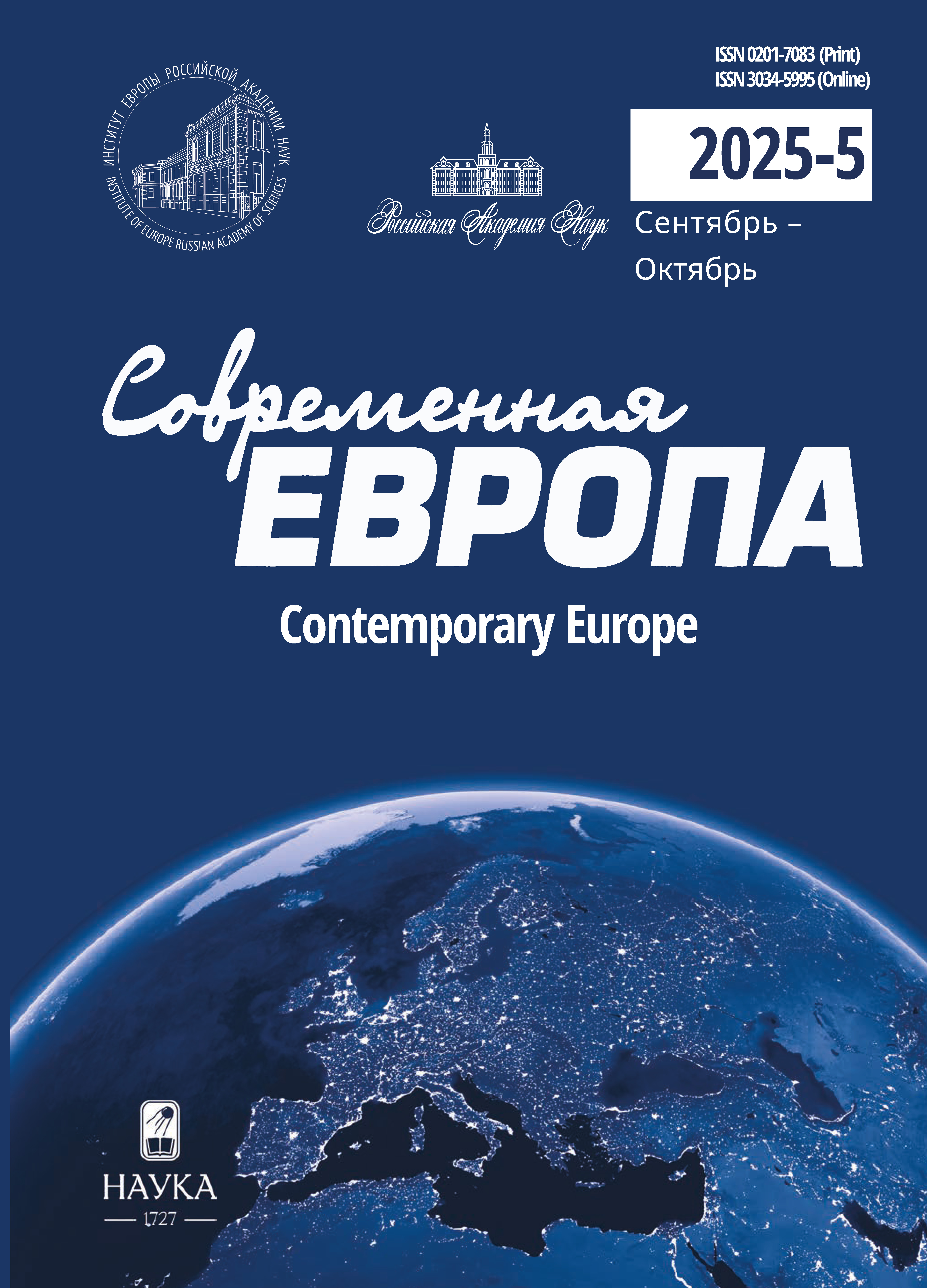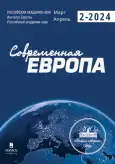ВЛИЯНИЕ РОССИЙСКО-УКРАИНСКОГО КРИЗИСА НА ПОЗИЦИИ НЕМЕЦКИХ ПАРТИЙ ПО ПРОБЛЕМЕ ЭНЕРГЕТИЧЕСКОГО ПЕРЕХОДА
- Авторы: ВАКАРЧУК Д.О1, ИВОНИНСКАЯ А.А1
-
Учреждения:
- Российский государственный гуманитарный университет (РГГУ)
- Выпуск: № 2 (123) (2024)
- Страницы: 57-69
- Раздел: Статьи
- URL: https://rjsvd.com/0201-7083/article/view/652138
- DOI: https://doi.org/10.31857/S0201708324020050
- ID: 652138
Цитировать
Полный текст
Аннотация
В 1990-е гг. в политической сфере ФРГ получил развитие дискурс энергетического перехода. Продолжительные политические дебаты о необходимости энергоперехода завершились после аварии на "Фукусиме–1" в 2011 г., когда среди ведущих немецких партий оформился консенсус по главным проблемам этого процесса. Однако украинский конфликт 2022 г. актуализировал использование ископаемых видов топлива и АЭС и привел к изменению устоявшихся позиций партий ФРГ по поводу достижения углеродной нейтральности. С помощью дискурс-аналитического подхода рассмотрено изменение энергетической политики Германии в условиях кризиса. Цель исследования – выявить дискурсивные сдвиги и преобладающие сюжетные линии в риторике партий ФРГ по проблеме энергоперехода после событий февраля 2022 г. Первое допущение заключалось в том, что в свете начала кризиса в риторике партий ФРГ сохранится доминирование дискурса энергоперехода. В качестве альтернативной гипотезы допускалось, что некоторые немецкие партии сдвинутся в сторону дискурса энергобаланса, и он станет преобладающим. В результате произойдет пересмотр энергетической политики. Контент-анализ записей партий ФРГ в социальной сети "Твиттер" подтвердил альтернативную гипотезу. Сделан вывод, что после начала энергетического кризиса под влиянием общественности ХДС/ХСС, СвДП и "Левая" сдвинулись в сторону дискурса энергобаланса, который стал преобладающим. Это способствовало корректировке политического курса немецкого правительства в энергетической сфере.
Об авторах
Д. О ВАКАРЧУК
Российский государственный гуманитарный университет (РГГУ)
Email: vakarchuk.d@rggu.ru
Кандидат исторических наук, доцент Москва, Россия
А. А ИВОНИНСКАЯ
Российский государственный гуманитарный университет (РГГУ)
Email: ivoninskaiaalena@mail.ru
Бакалавр Москва, Россия
Список литературы
- Белов В.Б. (2022) Смена парадигмы в энергетической кооперации Германии с Россией. Современная Европа. № 4(111). С. 5‒21. DOI: https://doi.org/10.31857/S0201708322040015
- Кавешников Н.Ю. (2017) Энергетическая безопасность в стратегии Могерини: выводы для России. Современная Европа. № 1. С. 22‒31. DOI: http://dx.doi.org/10.15211/soveurope120172231
- Меден Н.К. (2023) Электроэнергетика Германии в условиях энергокризиса: цена надёжности. Часть 1. Научно-аналитический вестник ИЕ РАН. № 2(32). С. 113‒124. DOI: https://doi.org/10.15211/vestnikieran22023113124
- Alonso-Muñoz L., Casero-Ripollés A. (2018) Political agenda on Twitter during the 2016 Spanish elections: issues, strategies, and user’s responses. Communication & Society. Vol. 31. Issue 3. P. 7‒25. DOI: https://doi.org/10.15581/003.31.3.7-23
- Buschmann P., Oels A. (2019) The overlooked role of discourse in breaking carbon lock-in: The case of the German energy transition. WIREs Climate Change. Vol. 10. Issue 3. DOI: https://doi.org/10.1002/wcc.574
- De Zúñiga H.G., Michalska K.K., Römmele A. (2020) Populism in the era of Twitter: How social media contextualized new insights into an old phenomenon. New Media & Society. Vol. 22. Issue 4. P. 585‒594. DOI: https://doi.org/10.1177/1461444819893978
- Eckert E., Kovalevska O. (2021) Sustainability in the European Union: Analyzing the Discourse of the European Green Deal. Risk and Financial Management. Vol. 14. Issue 2. 80. DOI: https://doi.org/10.3390/jrfm14020080
- Fairclough N. (1992) Discourse and social change. Polity Press, Cambridge, UK. 259 p.
- Fischer A., Küper M., Schaefer T. (2022) Gaslieferungen aus Russland können kurfristig nicht kompensiert werden. Wirtschaftsdienst. Vol. 102. Issue 4. P. 259‒261. DOI: https://doi.org/10.1007/s10273-022-3162-z
- Hake J., Fischer W., Venghaus S., Weckenbrock C. (2015) The German Energiewende – History and status quo. Energy. Vol. 92. P. 532–546. DOI: https://doi.org/10.1016/j.energy.2015.04.027
- Leipprand A., Flachsland C., Pahle M. (2016) Energy transition on the rise: discourses on energy future in the German parliament. Innovation The European Journal of Social Science Research. Vol. 30. Issue 3. P. 283–305. DOI: https://doi.org/10.1080/13511610.2016.1215241
- Louwerse T., Sieberer U., Tuttnauer O., Andeweg R. (2021) Opposition in times of crisis: COVID-19 in parliamentary debates. West European Politics. Vol. 44. Issue 5‒6. P. 1025‒1051. DOI: https://doi.org/10.1080/01402382.2021.1886519
- Muñoz M.M., Rojas-de-Gracia M.M., Navas-Sarasola C. (2022) Measuring engagement on twitter using a composite index: An application to social media influencers. Journal of Infometrics. Vol. 16. Issue 4. DOI: https://doi.org/10.1016/j.joi.2022.101323
- Soares F.B., Recuero R. (2021) Hashtag Wars: Political Desinformation and Discursive Struggles on Twitter Conversations During the 2018 Brazilian Presidential Campaign. Social Media + Society. Vol. 7. Issue 2. DOI: https://doi.org/10.1177/20563051211009073
- Sytnik A. (2019) Digitalization of Diplomacy in Global Politics on the Example of 2019 Venezuelan Presidential Crisis. Digital Transformation and Global Society. P. 187‒196. DOI: http://dx.doi.org/10.1007/978-3-030-37858-5_15
- Törnberg A., Törnberg P. (2016) Muslims in social media discourse: Combining topic modeling and critical discourse analysis. Discourse Context & Media. Vol. 13. P. 132‒142. DOI: https://doi.org/10.1016/j.dcm.2016.04.003
- Wiertz T., Kuhn L., Mattissek A. (2023) A turn to geopolitics: Shifts in the German energy transition discourse in light of Russia's war against Ukraine. Energy Research & Social Science. Vol. 98. 103036. DOI: https://doi.org/10.1016/j.erss.2023.103036
- Alonso-Muñoz L., Casero-Ripollés A. (2018) Political agenda on Twitter during the 2016 Spanish elections: issues, strategies, and user’s responses, Communication & Society, 31(3), pp. 7‒25. DOI: https://doi.org/10.15581/003.31.3.7-23
- Belov V.B. (2022) Smena paradigmy v energeticheskoi kooperatsii Germanii s Rossiei [Paradigm Change in the Energy Cooperation between Germany and Russia], Contemporary Europe, 4(111), pp. 5‒21. DOI: https://doi.org/10.31857/S0201708322040015 (In Russian).
- Buschmann P., Oels A. (2019) The overlooked role of discourse in breaking carbon lockin: The case of the German energy transition, WIREs Climate Change, 10(3). DOI: https://doi.org/10.1002/wcc.574
- De Zúñiga H.G., Michalska K.K., Römmele A. (2020) Populism in the era of Twitter: How social media contextualized new insights into an old phenomenon, New Media & Society, 22(4), pp. 585‒594. DOI: https://doi.org/10.1177/1461444819893978
- Eckert E., Kovalevska O. (2021) Sustainability in the European Union: Analyzing the Discourse of the European Green Deal, Risk and Financial Management, 14(2), 80. DOI: https://doi.org/10.3390/jrfm14020080
- Fairclough N. (1992) Discourse and social change, Polity Press, Cambridge, UK.
- Fischer A., Küper M., Schaefer Th. (2022) Gaslieferungen aus Russland können kurzfristig nicht kompensiert werden, Wirtschaftsdienst, 102(4), pp. 259‒261. DOI: https://doi.org/10.1007/s10273-022-3162-z
- Hake J., Fischer W., Venghaus S., Weckenbrock C. (2015) The German Energiewende – History and status quo, Energy, 92, pp. 532‒546. DOI: https://doi.org/10.1016/j.energy.2015.04.027
- Kaveshnikov N. (2017) Energeticheskaya bezopasnost' v strategii Mogerini: vyvody dlya Rossii [Energy Security in Mogherini’s Strategy: Conclusions for Russia], Contemporary Europe, 1, pp. 22‒31. DOI: http://dx.doi.org/10.15211/soveurope120172231 (In Russian).
- Leipprand A., Flachsland C., Pahle M. (2016) Energy transition on the rise: discourses on energy future in the German parliament, Innovation The European Journal of Social Science Research, 30(3), pp. 283‒305. DOI: https://doi.org/10.1080/13511610.2016.1215241
- Louwerse T., Sieberer U., Tuttnauer O., Andeweg R. (2021) Opposition in times of crisis: COVID-19 in parliamentary debates, West European Politics, 44(5‒6), pp. 1025‒1051. DOI: https://doi.org/10.1080/01402382.2021.1886519
- Muñoz M.M., Rojas-de-Gracia M.M., Navas-Sarasola C. (2022) Measuring engagement on twitter using a composite index: An application to social media influencers, Journal of Infometrics, 16(4). DOI: https://doi.org/10.1016/j.joi.2022.101323
- Meden N.K. (2023) Elektroenergetika Germanii v usloviyakh energokrizisa: tsena nadezhnosti. Chast' 1 [The German Power Industry Under Conditions of Energy Crisis: the Price of Reliability. Part 1], Scientific and Analytical Herald of the Institute of Europe RAS, 2(32), pp. 113‒124. DOI: https://doi.org/10.15211/vestnikieran22023113124 (In Russian).
- Soares F.B., Recuero R. (2021) Hashtag Wars: Political Desinformation and Discursive Struggles on Twitter Conversations During the 2018 Brazilian Presidential Campaign, Social Media + Society, 7(2). DOI: https://doi.org/10.1177/20563051211009073
- Sytnik A. (2019) Digitalization of Diplomacy in Global Politics on the Example of 2019 Venezuelan Presidential Crisis, Digital Transformation and Global Society, pp. 187‒196. DOI: http://dx.doi.org/10.1007/978-3-030-37858-5_15
- Törnberg A., Törnberg P. (2016) Muslims in social media discourse: Combining topic modeling and critical discourse analysis, Discourse Context & Media, 13, pp. 132‒142. DOI: https://doi.org/10.1016/j.dcm.2016.04.003
- Wiertz T., Kuhn L., Mattissek A. (2023) A turn to geopolitics: Shifts in the German energy transition discourse in light of Russia's war against Ukraine, Energy Research & Social Science, 98, 103036. DOI: https://doi.org/10.1016/j.erss.2023.103036
Дополнительные файлы











